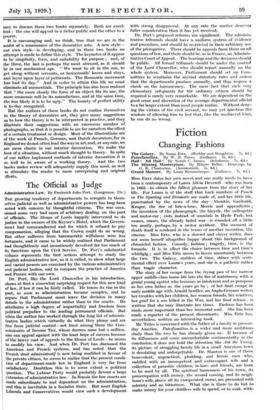The Official as Judge
Administrative Law. By Frederick John Port. (Longman. 21s.)
Tax growing tendency of departments to arrogate to them- selves judicial as well as administrative powers has long been noted with concern by thoughtful citizens. The war occa_ sinned some very bad cases of arbitrary dealing on the part of officials. The House of Lords happily intervened to do justice to the owners of De Keyser's Hotel, which the Govern- ment had commandeered and for which it refused to pay compensation, alleging that the Crown could do no wrong. But other sufferers from bureaucratic wilfulness were less fortunate, and it came to be widely realized that Parliament had thoughtlessly and incautiously devolved far too much of its functions upon the Civil Service. Dr. Port's substantial volume represents the first serious attempt to study the English administrative law, as it is called, to show what large and varied powers are exercised by the various administrative and judicial bodies, and to compare the practice of America and France with our own.
Dr. Port, like the Lord Chancellor in his introduction, shows at first a somewhat surprising respect for this new kind of law, if law it can be fairly called. He traces its rise in the past, as soon as administration became complex, and he argues that Parliament must leave the decision in many details to the administrator rather than to the courts. He attributes a high degree of impartiality and freedom from political prejudice to the leading permanent officials. But when the author has worked through the long list of adminis- trative bodies which virtually do what they please and are free from judicial control—not least among them the Com- missioners of Income Tax, whose decrees none but a million- aire can appeal against with the least hope of success because of the heavy cost of appeals to the House of Lords—he seems to modify his view. And when Dr. Port has discussed the American and French systems, and has noted that the French draft administrant is now being modified in favour of the private citizen, he seems to realize that the present condi- tion of department-made law in England is very far from satisfactory. Doubtless this is to some extent a political question. The Labour Party would probably favour a large extension of administrative law. In Russia the law courts are made subordinate to and dependent on the administration, and this is inevitable in a Socialist State. But most. English Liberals and Conservatives would view such a development
with strong disapproval. At any rate the matter deserves fuller consideration than it has yet received.
Dr. Port's proposed reforms are significant. The adminis- trative tribunals should have a uniform system of evidence and procedure, and should be restricted in their arbitiary use of the prerogative. There should be appeals from them on all questions of law, and there should be, as in France, an Adminis- trative Court of Appeal. The hearings and the decisions should be public. All formal tribunals should be under the control of the Lord Chancellor, who should report annually on the whole system. Moreover, Parliament should set up Com- mittees to scrutinize the myriad statutory rules and orders that the departments produce annually, and thus impose a check on the bureaucracy. The mere fact that such very elementary safeguards for the ordinary citizen should be required is surely very remarkable. We are dependent on the good sense and discretion of the average departmental official to a far larger extent than most people realize. Without deny- ing the virtues of the civil servant, we may yet question the wisdom of allowing him to feel that, like the mediaeval king, he can do no wrong.
































 Previous page
Previous page